Crossing the Equator
Ecuador is famous for its snow capped grandios volcanoes. The promise of viewing Cayambe, Cotopaxi and the recently erupting Tungurahua all beckoned. We travelled south along the Avenida Volcànes, and yes we did see the volcanoes.... well only the lower flanks as cloud after cloud rolled over allowing us only tiny glimpses of thier magnificence.
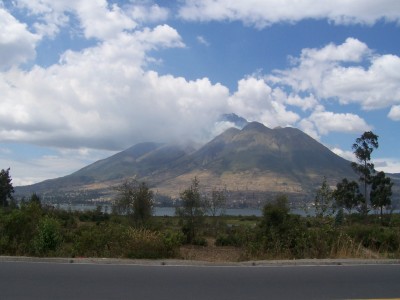
Volcàn ImbaburaBorder Crossing
Exit Colombia (Ipiales)
* Go to the Migration window (there is only one window for entry and exit),
* Wait in line for the solitary officer to process the two bus loads of people in front of you,
* Wait,
* Wait and
* Wait some more,
* Have your passports stamped out - Note: All passport holders must be present
* Go to Aduana and return the vehicle papers - very easy,
* Cross the bridge to Ecuador.
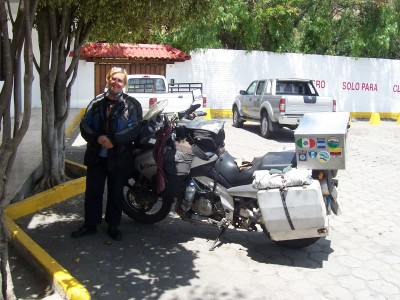
Jules & Piggy
Enter Ecuador (Rumichaca)
* Go to the Migration window (same deal as in Colombia),
* Wait in line for the solitary officer to process the two bus loads of people in front of you (same bus loads from Colombia),
* Wait,
* Wait and,
* Wait some more,
* Have your passports stamped in to Ecuador,
* Go eat lunch! By now we were starving (there is a good restaurant cheap next to the Migration building),
* Go to Aduana for temporary vehicle import - if the computer system is working otherwise you need to go 10kms south of the border to Tulcàn. Staff are very friendly and helpful in Tulcàn. Make sure you have copies of your passport, drivers licence, vehicle title and registration. You will be presented with a one page permit - keep it handy for police checks.
* Ride off!
For us the process took all day, and that included being interviewed for Colombian TV news about our trip and our life in Australia!
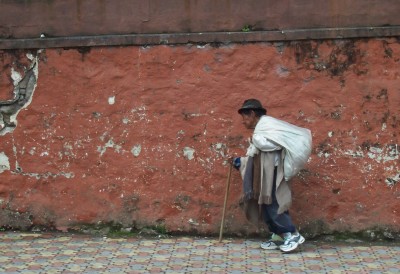
Old Man - Ecuador
Feeling a little claustrophobic and hanging out for some long country rides our route took us from Toulcán to Marcara, skirting Quito. Each day was a surprise with the scenery changing dramatically, high into the Ecuadorian Andes through rich farming country with cold air biting our faces and crops of potatoes in more varieties than you can imagine. Down into low hot tropical valleys filled with bananas, sugar cane and rice. Finally into dry desert mountains covered in cactus and spiney desert trees. Though we only spent two weeks in Ecuador we enjoyed the country immensley.
Riding in this small South American country is fantastic, however there are two dangers to keep in mind.
1. Road Surface - often bumpy and pot holed or destroyed by landslides.
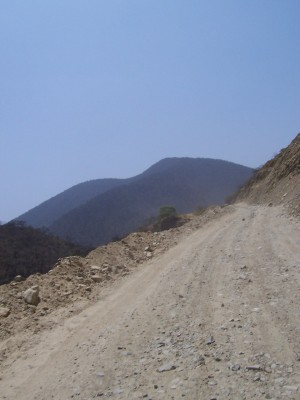
Riding over landslide area - Loja - Marcara road
2. Bus Drivers - These guys are maniacs and full of machismo! Continually racing each other at other road users expense. Pushing traffic off the road, we recieved first hand experience of this game. Driving through a one inch thick oil slick, in the rain and down a steep hill with no brakes and bald tyres seems more secure than being too close to these nutters! Ironically a week after leaving Ecuador we saw in the news that 47 people had been killed... you guessed it... in a bus crash.
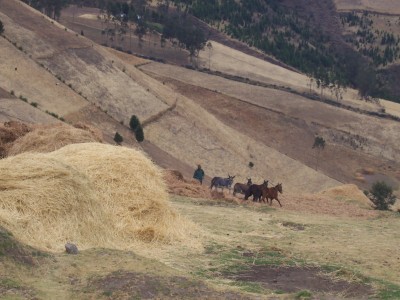
Farming the land
We were picking at the last of our meal. Chicken, with the ever present rice and salad when she appeard at the end of the table.
No more than 10 years old, grubby face and hands, eyes downcast, shy.
Are you hungry?' we asked, she nodded without looking at us.
There was still a lot of rice and chicken left that we did not want to eat and even some salad. We looked at each other and what we intended to throw away. She looked at the plate too.
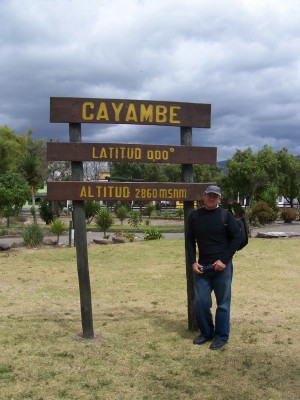
Crossing the Equator - Cayambe
We passed over the plate to her and she quickly snatched a few bones and turned to leave. 'Wait' we asked her, and gave her a fork.
Silently she ate the rice and salad while we picked all the chicken from the bones and placed it on her plate. Carefully she manouvered the fork to clean the plate of every grain of rice and the last morsels of chicken.
Avoiding looking at us she quietly said thank you, dissappeared as quickly and silently as she had appeared, taking with her the naked bones.
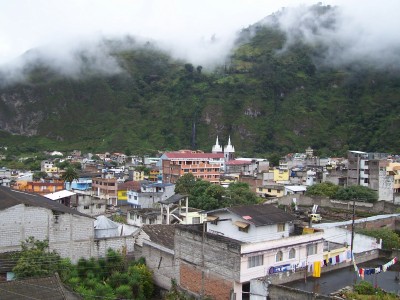
Baños Township
We headed south for the tiny resort town of Baños, somewhat precariously placed only 8 kilometers from Volcàn Tungurahua crater. Whilst in Colombia we had seen news reports on the television of the violent eruption taking place within this mountain and were keen to witness the aftermath first hand.
Travelling through the long valley that winds down from the Pan-American Highway we see, far away upon one side of Tungurahua, an enourmous area of chaotic dark terrain continuing from the river below to way above finally disappearing into the clouds to the crater some 5000 meters above sea level.
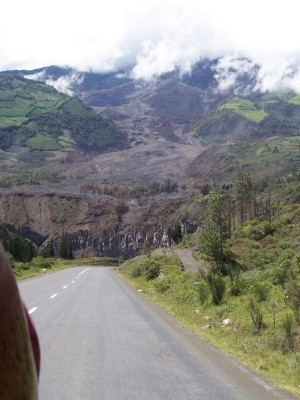
Lahar from recent eruption
We continue along the narrow winding road, sometimes covered with wet volcanic ash. As we draw nearer to the lahar we notice puffs of dust being thrown up high on the flank and realise that this is what is left of the road to Baños as the few vehicles travel to and from.
Grant begins to become apprehensive, thinking the road may be difficult on the bike. We arrive at a bridge and cross with a turbulent black mass of water rushing underneath. Once across we ascend rapidly to a dirt road which is surprisingly in good condition and easy to traverse.
For perhaps one kilometer a stretch of scorched and tumbled earth is evident. This is the lahar caused by the recent pyroclastic flow, super heated gases and ash from the volcanic explosion travelling at more than 160km/hour, down the slopes.
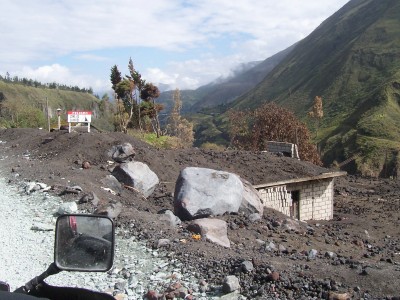
Riding over destroyed road
Further down towards the river we see several houses almost completely buried, allowing the fullness of the surrounds to be taken in. Once again the forces of nature have intimidated us, yet at the same time we are astounded.
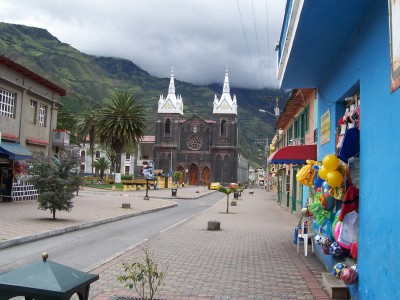
Church (constructed from lava) - Baños
Excited about seeing our first Inca ruins in South America we climbed aboard the local bus from El Tambo for the 9 kilometer journey to the archeological site of Incapirca.
The short distance took about half an hour slowly winding up the mountains through numerous indigenous settlements, farms and a tapestry of plowed fields with meticulously planted crops.
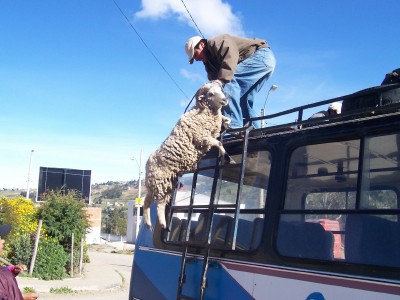
Sheep Transportation
The bus filled with locals, in traditional dress, thier goods and chattels including a sheep that was lifted up on to the roof, by its horns, and tied down, it was not happy being up there, kicking, stomping and bleeting... guess he wanted a first class seat!
Archeologists believe that Incapirca was a strategically placed millitary post on the Royal Highway that ran from Cusco to Quito.
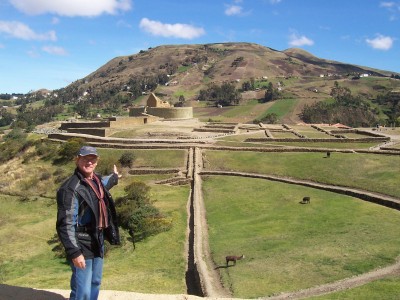
Incaprica
The central structure named El Castillo by the Españoles may have been an astronomical observatory. It is a beautifully placed site with stunning views and marvelous stone masonery. Surprising is the grove of eucalyptus (no Koalas though) around the site.
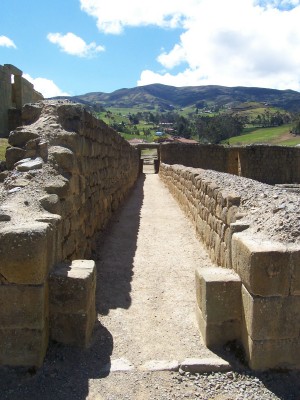
Incaprica
It was 9 am, yet another 3500 meter pass had come and gone, complete with the cool drizzle of the rain typical of the season, if there is such a thing at this altitude and so close to the equator.
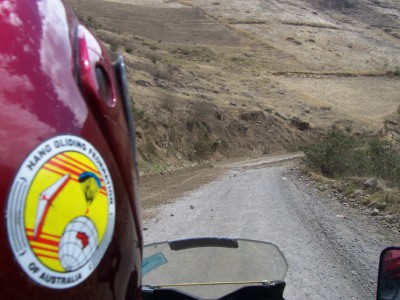
Road - Riobamba to Cañar
We descended steadily with the paved road deteriorating to non existence leaving compacted earth for a large part of the descent, a pleasant change from the badly potholed tarmac. Somewhere along the way we rounded a bend and perched at the edge of the cliff we find two Ecuadorian Police Officers vigilantly standing in the middle of the road.
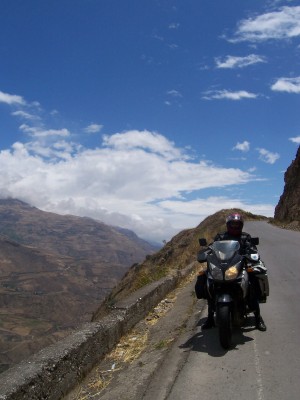
At the pass to the Chimborazo Valley
We were hailed down, some what unexpectedly (more often than not we are waved through), one of the Officers greets us with a friendly 'Buenos Dias' motioning us to move Miss Piggy to the side of the road, quite naturally, we do so without hesitation.
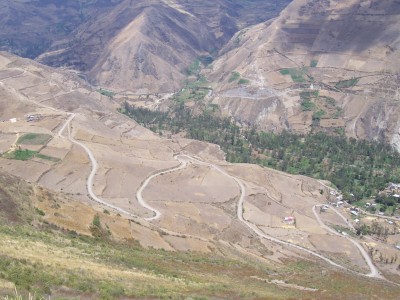
Overlooking the Chimborazo Valley
'Documentos, por favor' the Officer asks
'Si, si, no problemo' as Grant dives his hand into the tank bag and collects the required paper.
The Officer peruses the document with a slightly disinterested expression and then the true interrogation begins.
Where are you from? How far have you come? How big is the bike? Did you come by boat from Australia? etc etc etc.
Grant steadily answers the questions, thinking perhaps that he is finally reaching a new level in Spanish.
The Officer then asks 'How much did the moto cost?'
'Oh' Grant replies confidently 'It is very expensive in Australia. New it costs approximently $160,000.00 Australiano!'
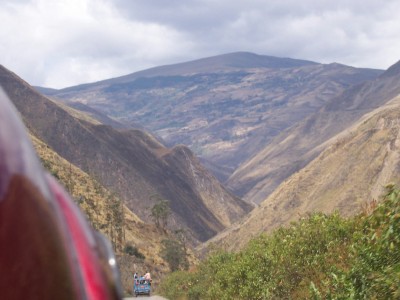
The road into the Chimborazo Valley
The Officers eyes widened appreciably as his jaw dropped in surprise and exclaimed '¡Aye, muy muy caro!!' (very very expensive)
Grant pauses regurgitating the dialog, at this point Jules is forced to intervene and explained that the correct price is $16,000.00 Australiano.
Hmm perhaps Grants Spanish needs some work! All credibility was not lost and the Officer gave Grant a gift of his old Police Badge before wishing us a safe and pleasant journey!
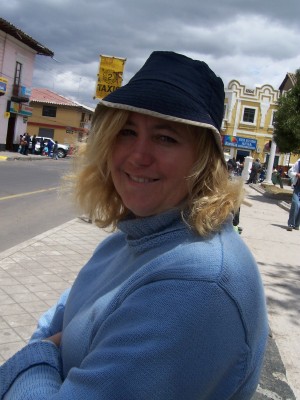
Jules - Cayambe
Cuenca is one of the premier colonial cities of Ecuador. We attempted to negotiate the way into centro, after half an hour of going around in circles we gave up and went to the nearby town of Baños. (There are two towns named Baños in Ecuador - for clarity this town shall be known as Baños Feo - Baños Ugly.)
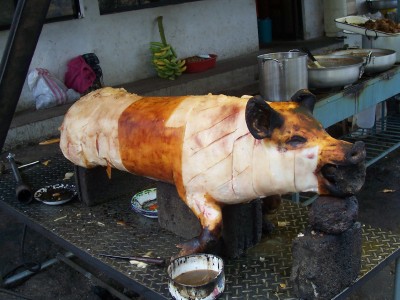
Pig on a spit - anyone for pork??? YIKES!!!
A beautiful and imposing blue church is perched high above the town and overlooks the valley that contains Cuenca. There are many mineral hot baths to choose from, stunning expensive resorts and cheap 'n' nasty hotels.
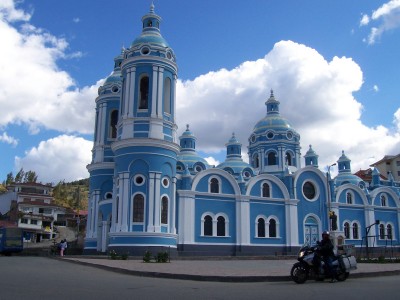
Blue Church - Baños Feo
We pull up to the first establishment. The lazy staff looked at Jules as if she was insane when she asked how much a room would cost for the night. 'The whole night?' they questioned and then mutter between themselves, eventually deciding on a price.
Ok, so they don't seem to get much overnight custom Jules thinks and moves on to the next hotel. Sensing Deja Vú or a glitch in the matrix the scene replayed itself and continued to do so until hotel number 4 which finally, at least, had parking.
Meanwhile Grant, waiting patiently, had begun to notice that this town had a plethora of discos and kareoke bars. What was this place? Not the sweet little resort village Baños we had visited further to the north. It was summed up nicely when we turned the TV on that night, and the only clear channel was a porn channel!
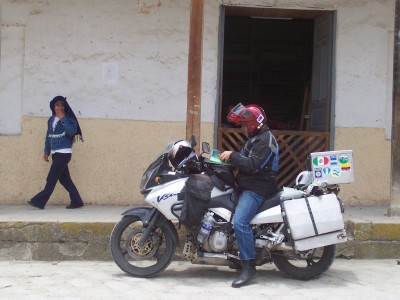
Grant & Piggy - Saraguro
Choosing not to linger in Baños Feo we packed early for an excellent motorcycle ride to Loja where we stayed a few days. Continuing through stunning scenery, land slide damaged roads, quaint indigenous and colonial villages, one hosting a rodeo, then on towards the town of Marcara and the border with Peru .
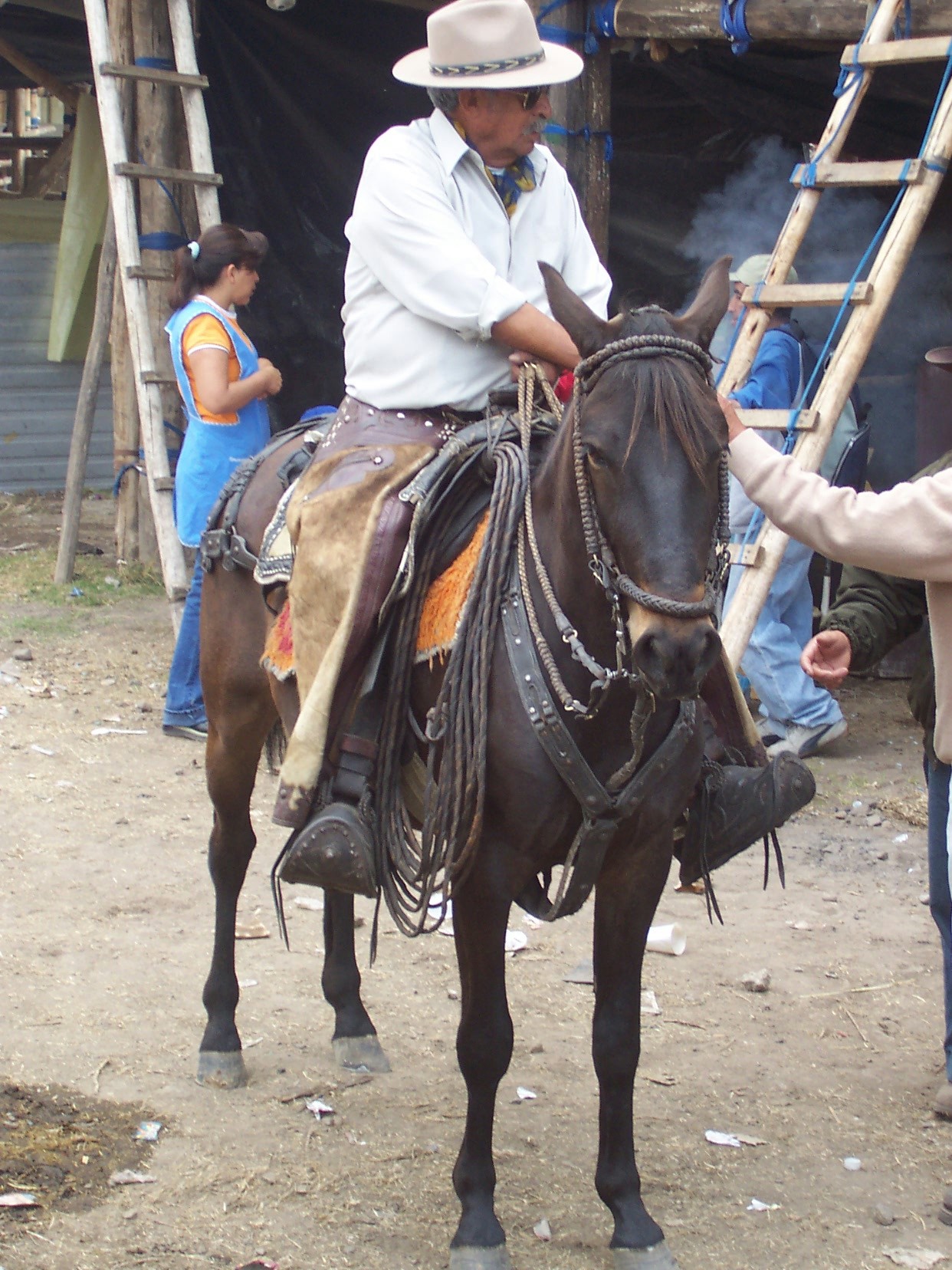
Rodeo Man
